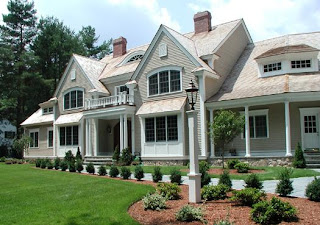How to Compute House Property Under Section 22 of Income Tax Act.
Definition:- Annual value of any property or land adjacent thereto of which assessee is the owner.
Annual value of any property or land adjacent thereto of which assessee is the owner.If any portion of the land or building owned by the assessee is used for the purpose of any business or profession carried on by the assessee and the profits therein are chargeable to tax, then the income from property will not be charged under this head
Income Tax Section 23
Determination of annual value:-- Annual value of house property is computed mainly on the basis of
whether or not the house is let out.The annual value will be either
- reasonable rent that can be realized for the property or
- actual rent received if it is greater than the reasonable rent or
- when the property is let out but remains vacant during the whole or part of the year and because of this, the actual rent received is less than the reasonable rent, then the actual rent received. Property taxes paid can be deducted from the annual value irrespective of the year in which the tax was actually due.
- The annual value will be nil if
- the owner occupies the house for his own residence
- the person has to stay in a building not owned by him because of his employment, business or profession at any other place. The annual value will not be nil if either the house was let out during the whole or any part of the year or the owner has derived any other benefit from the property
- If the property consists of more than one house, then the owner has the option to specify one of the houses for which the annual value has to be determined as if it is let out
Income Tax Section 24
Deductions from Income from house property
The following deductions can be made from the income under this head:- an amount equal to thirty percent of the annual value
- where the property has been acquired, constructed, repaired, renewed
or reconstructed with borrowed capital, the amount of any interest
payable on such capital:
Provided:- if the annual value is “nil”, then the amount of deduction can not exceed Rs.30,000.00(Rupees thirty thousand).
- if the house is acquired or constructed after 1st April 1999 with capital borrowed, and the acquisition or construction is completed within three years from the end of the financial year in which capital was borrowed, then the amount of deduction shall not exceed Rupees one lakh fifty thousand.
- Amount of actual rent received or receivable will not include the amount of rent which the owner can not realized.(Explanation to Section 23)
- If unrealised rent allowed as deduction is realised subsequently, then it will be charged to tax in that year, whether or not, the individual is the owner of that property in that year. Even if unrealized rent is not allowed as deduction, the unrealized rent received subsequently is charged under this head (Section 25A, Section 25AA)
- If a person receives arrears of rent from his property, it will be charged to tax in the year in which such rent is received, even if the assessee is the owner of that property or not.(Section 25B)
Property owned by co-owners
When property consisting of land or buildings is owned by two or more persons and their share are definite and ascertainable, then their individual share of total income will be charged under the head “Income from house property”. When the annual value of house property which is owned by two or more persons is nil, each individual is entitled to declare”nil” amount as the income from house property.(Section 26)
Owner of the House Property (Income Tax Section 27)
Owner is a person who is entitled to receive income from the income from the property in his own right. Registration of the sale deed is not required in the context of Section 22.
Deemed ownership
In the following circumstances, the ownership is to be considered as deemed for the purpose of computing chargeable income under the head “Income from House Property”.
- When house property is transferred to spouse (otherwise than in connection with an agreement to live apart) or minor child (not being a married daughter) without adequate consideration (Section 27(i))
- Holder of an impartial estate
- When a building or a part thereof is allotted or given in lease to members or shareholders of a co-operative society or company under a house building scheme of the co-operative society or company, the allot-tees are to be considered as the owners for income tax purposes.
- A person who is allowed to take possession of a building or part thereof under Transfer of Property Act,1882.
- A person who takes on lease a building or part thereof for lease for a period of 12 months or more
Central Sales Tax (CST) Verification and Validation Service
Know your TAN. Find your TAN
Track your PAN or TAN Application Status Applied through NSDL TIN
UTI Pan Card Application Center
Track your PAN/TAN Application Status
Calculate your Income Tax liability
Know Your PAN number. Verify Your PAN Number

No comments:
Post a Comment